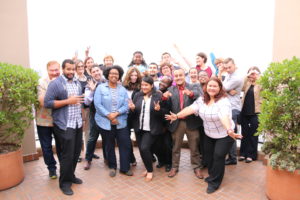02 May Sibling Connections In Foster Care, Why They’re Important
Sibling Connections In Foster Care are a Lifeline to Success
Sibling Connections Interview Shows Importance
As we go through life, our relationships bind us to our past and future. Whether it’s family, friends, neighbors or even employers, we are always defining who we are in relation to others.
Sibling connections in foster care are no different. Lura Landon, the FCAA Chapter President for Washington State, shared her experience of entering foster care with her two sisters.
“When I was six, I was placed into my first foster home with my older and younger sister,” Lura said. “My older sister had trouble adjusting and was eventually moved to another home.”
Lura would remain in the same home with her younger sister but had little contact with her older sister. “After we initially split, there were no phone calls or visits,” Lura said. “Once we regained contact, I saw her once a year.”
The summer before 9th grade, Lura moved to another foster home after a conflict in her kinship placement. Her younger sister remained in the home. Lura would finish high school without either of her sisters living with her.
“After that, I saw my younger sister twice in four years,” Lura said. “I worked and hung out with friends to avoid thinking about being away from my sisters and family.”
Lura went on to graduate high school and start her own family. She reconnected with her sisters and lived with them at different times in her adulthood. Lura says a number of conflicts came up between her and her sisters which led to no contact with them.
“I hope we are able to resolve our differences,” Lura said. “It’s important to have a connection with one’s siblings.”
It is estimated that 85% of children entering foster care have siblings. For sibling groups who enter care together, the longer they remain, the more likely they are to be separated. Sibling connections while in care help children to be more resilient and maintain family bonds. More importantly, sibling relationships carry over into adulthood, lasting a lifetime.
“The fact my sisters and I had a connection prior to foster care is significant and should have been supported through more organic visitation and phone calls,” Lura said. “This is why sibling connections are one of our advocacy pillars for FCAA.”
Lura points out the power of sibling connections by mentioning FCAA siblings who went through foster care together. They attend chapter meetings, participate in FosterWalks and support other members. “We advocate changing policy and practice for our brothers and sisters in care,” Lura said. “This is something that FCAA has always done.”
For more information on supporting sibling connections visit https://www.childwelfare.gov/pubs/siblingissues/.




Lura Landon
Posted at 15:36h, 10 MayThank you Chauncey! Thank you David!
David White
Posted at 13:55h, 04 MayTwo years ago, we developed Sib-Link. We bring siblings in different placements together every month. This is for children whose parental rights are terminating or there is a concurrent adoption/guardianship plan (ie: the reunification plan, and its visits) are falling apart. We began with 8 sibling groups. We are now at 30 sibling groups. I’m happy to share more of the approach.
Jamerika Haynes
Posted at 12:19h, 11 MayThanks David for reading the blog and for telling us about Sib-Link. Do you have a website or more information where we could learn more about this program?
Chauncey Strong
Posted at 15:36h, 02 MayThanks so much Lura for sharing your story and for FCAA highlighting this important topic.
Sibling connections has always been an important issues for me because my two brothers and I, (we are triplets), were able to be adopted together and keep our sibling bond. I know the value of a sibling connection personally but professionally I also know that too often many youth in care are separated from their siblings.
It’s so important that as alumni we use our voice and our stories to keep the issue of supporting sibling connections front and center as we discuss improving the foster care/child welfare system. We must advocate for continued improvement not only in policy but also in every day practice so that young people in foster care don’t lose their sibling bonds. If we don’t advocate for change then who will? (“We are the one’s we’ve been waiting for”- June Jordan).
Keep up the good work FCAA!!!
Chauncey
VA Chapter
Jamerika Haynes
Posted at 12:22h, 11 MayThanks Chauncey for sharing your story and for the kudos! I am glad to hear you were able to stay connected with your siblings. Thanks for being a part of FCAA!
Jamerika Haynes
Posted at 12:23h, 11 MayThanks Chauncey for sharing your story. I am glad to hear you remain connected with your siblings. Thank you for being a part of FCAA!